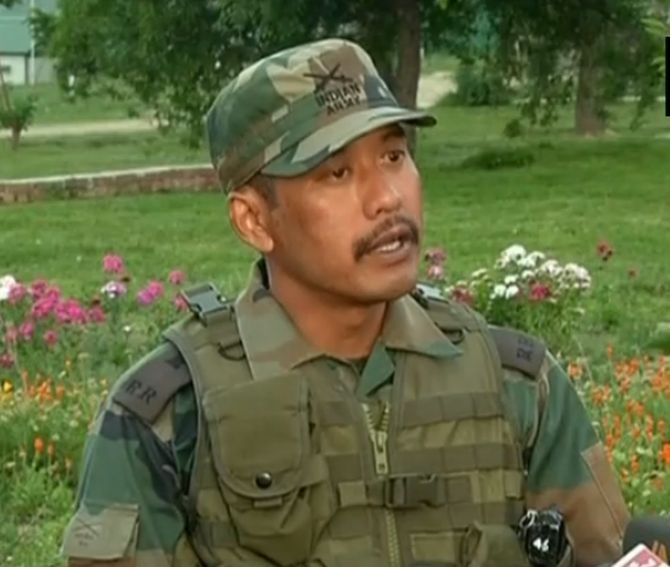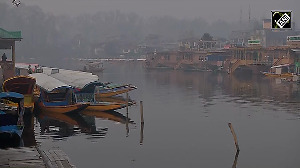Major Gogoi thought like Chanakya when he tied a Kashmiri man on an army jeep to keep the stone pelters at bay, argues Rajeev Sharma.

In these days of strict observation of human rights, one would have expected a tsunami of outrage after the Indian Army awarded a commendation medal to Major Leetul Gogoi.
The officer from Assam had tied a Kashmiri man on the bonnet of an army jeep to ward off stone pelters in the Kashmir valley.
But the opposite has happened -- in the Indian social media at least -- a tried and trusted bellwether cock to gauge the public mood.
On the face of it, the Indian Army has won this war of perceptions if the overwhelming response Major Gogoi has received on social media is any indication.
The fact is that the Indian Army has won this battle of perceptions hands down.
The question is how does one view Major Gogoi's action and on what parameters: On the human rights plane or on the operational aspects of a security force which has been battling an insurgency-type situation in Kashmir for years?
It is a tricky question given the situational response to the major's outlandish action.
This episode has to be examined in the context of the tough life-or-death kind of situation that has existed in insurgency-hit Kashmir for decades, particularly 'the complete jaw for one tooth' campaign launched by the Indian Army in the recent past.
This episode has to be examined in the context of the tough situation that has existed virtually all along the Line of Control -- the LoC -- which has characteristically triggered a debate whether the Indian Army did the right thing or whether the response of a section of the Indian media or the international media attacking the Indian Army over human rights-related issues is justified.
Issues related to human rights and their importance cannot be overstated. This is summed up in John F Kennedy's one-line quote: 'The rights of every man are diminished when the rights of one man are threatened.'
But the fundamental question is whether human rights are the legitimate property of only law violators or terrorists? Aren't the security forces too entitled to human rights?
To get an insight into the pressure cooker kind of situation that the security forces around the world operate in, it would be advisable to mull on the thoughts of the great Indian strategic mind Chanakya, also known as Kautilya or Vishnugupt, who lived 23 centuries ago.
His observations made in the chapter on 'internal and external dangers' in his seminal book Arthshastra are still shockingly relevant in today's context. Here is how:
Chanakya notes that threats to internal and external security of a nation arise due to wrongly concluded 'treaties and other settlements'.
What a statement in context of today's India as we know what kind of problems were unleashed in the Nehruvian era and how India is still paying heavily for those mistakes.
Chanakya places external/internal threats in four categories:
- Threats from internal originators and internal abettors which are like the 'fear from a lurking snake'.
- The purely external threat, both originated and abetted by foreigners.
- The internally originated but externally abetted threat.
- The externally originated, internally abetted threat.
Now sample Chanakya's quotable quote: 'Dissatisfaction or disloyalty can be got rid of by putting down the leaders; for in the absence of a leader or leaders, the people are easily governed and they will not take part in the intrigues of enemies.'
It is as if Chanakya is alive and commenting on the ground zero situation in Kashmir.
- Took this step to save locals, says Major who tied man to jeep
- Is dragging a person for 28 km bravery, asks Kashmiri who was tied to a jeep
- 'Never in my life have I thrown stones': Kashmir man in army jeep video
- Major who tied man to jeep as 'human shield' awarded
Major Gogoi thought like Chanakya when he tied the Kashmiri man on a jeep's bonnet to keep the stone pelters at bay.
Human rights activists may fret and fume over this harsh method, but the fact is that under the circumstances this was an out of the box thought and a perfect remedy.
It should not matter if the army chief's commendation certificate for Major Gogoi came even as a court of inquiry into the incident is pending and that the honour for the major has pre-determined the outcome of this inquiry.
What matters is the overwhelming public support for Major Gogoi's action, which is nothing but a re-run of Chanakya Niti.
Needless to say, public opinion matters most, more so in a vibrant democracy like India.
Rajeev Sharma, a strategic analyst, tweets @Kishkindha
IMAGE: Major Leetul Gogoi of the 53 Rashtriya Rifles has been awarded the army chief's commendation certificate for his 'sustained efforts' in counter-insurgency operations.










